-
Posts
2,351 -
Joined
-
Last visited
Content Type
Profiles
Forums
Store
Help Articles
Posts posted by Patrick S
-
-
I don't know how light you need to be, but here's a simple butter/sugar/lemon juice icing you could whip to an airy consistency.
And here's a meringue lemon icing that's probably a bit lighter:
-
Patrick..your choc marshmallows look great..are the 1/2 cup chocolate for a full batch?
Yeah I used about 1/2 cup minus 1 tablespoon of cocoa for a full batch. I'm sure you could get by with 1/4 cup, but the 1/2 cup version doesn't seem over-cocoa-fied at all.
-
I'd recommend against using raw yolks in anything, but if you do use them, I'd certainly recommend that you refrigerate whatever you make with them, which will slow (but not stop) the growth of bacteria in the yolk droplets in the icing (egg yolk is an almost ideal bacterial medium).
-
Patrick, I'd love to know how you cover them in caramel. Any recipe or photos would be auesome.............
I'm invisioning one heck of a yummy mess.
I haven't done this before, so I imagine I'll be doing some experimentation with the caramel before I get it right.
I'm thinking maybe freeze the marshmallows first to firm them. I'll at least try to cover/dip them with warm caramel, but if that doesn't work (if the warmth mushifies the marshmallows), I'll cool the caramel first, cut it out into squares and then stretch the squares by hand into a sheet that I can wrap around the marshmallows.
-
Its funny that you mention that, Wendy -- my wife made exactly the same suggestion when I was finishing making the vanilla version, which I made earlier tonight using my last 3/4 of Madagascar vanilla bean and a t. of extract. Since I'd already poured the marshmallow into a pan for 'curing,' I might try the following tomorrow -- cutting the marshmallows into 1.5" x 0.5" rounds, covering the rounds with caramel (making what we in KY call Modjeskas), and then rolling in rice crispies.
-
I tried nightscotsman's chocolate version, using a scant 1/2 cup of Scharffen Berger cocoa and about 1 tablespoon of Medaglia D'Oro espresso powder. They're awesome, in my humble opinion. I'm calling them Mocha-mallows.
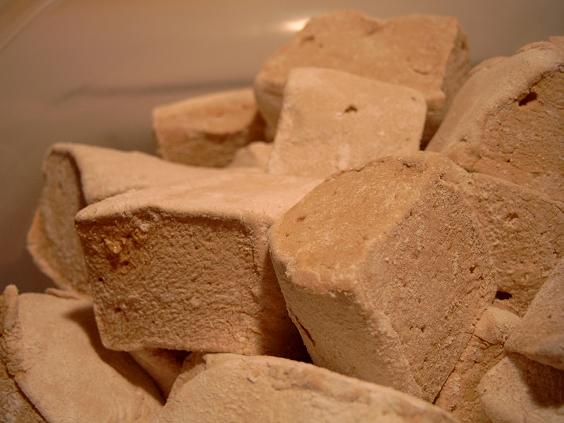
-
Of course traditional French mousse does not contain gelatin - I'm using the word in its modern English usage, not its tradional French usage. Whether its etymologically correct or not, 'mousse' is what most people in my culture would call that foamy caramel dessert set with gelatin.
-
You can get high pressure with a cheap bench vice, but you'd still need some kind of pill-form mold or something. What exactly are you trying to make? Just curious. . . If you're trying to package supplements or pharmaceuticals, you could just use gel-caps.
where can i get gel caps?
all great advice
thanks
just working on a base technique, not particularly concerned with the particular elaboration,
but for a new interactive dessert Sydney May 2000
I wanted to make tubes of pills to garnish, perhaps to go,
probably with some citrus sugar, litchi and rosewater
a la vodka red bull
solid cocktails
You can find empty gel-caps at vitamin stores, head-shops, or at lots of online stores. For example:
Good luck!
-
You can get high pressure with a cheap bench vice, but you'd still need some kind of pill-form mold or something. What exactly are you trying to make? Just curious. . . If you're trying to package supplements or pharmaceuticals, you could just use gel-caps.
-
I made nightscotsman's strawberry marshmallows tonight. Very yummy. Here's some pics I took along the way.
The puree with water and gelatin.
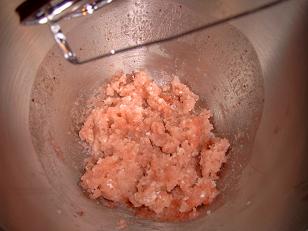
The sugar/corn syrup at 238F, just before adding to puree mixture.
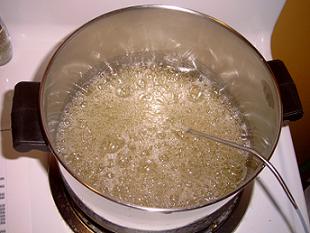
The sugar syrup is added to the puree mixture, the beating begins.
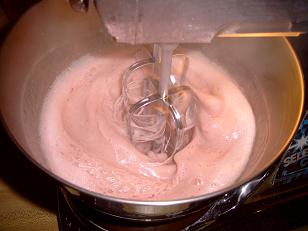
. . . steadily fluffing. . .
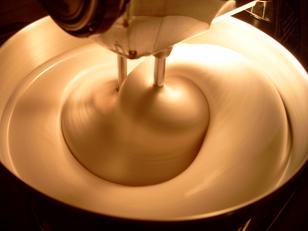
. . . and fluffing. . .
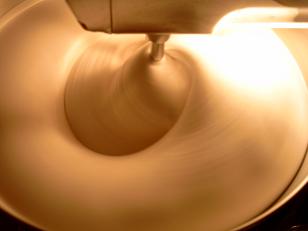
Nothing to do now but wait.
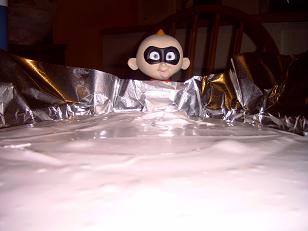
EDIT TO ADD PICTURES:
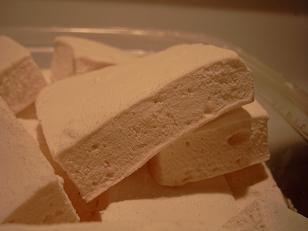
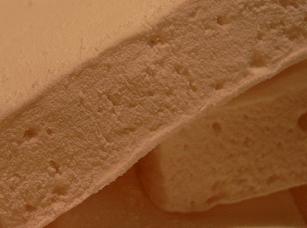
-
Moopheus, momlovestocook, jgarner, nightscotsman, chefpeon, Jason, KarenS and everyone else -- thanks so much for your help. I look forward to experimenting with these different solutions.
-
I have heard from SO many people that pasteurized egg whites don't whip well, so rather than actually finding out for myself, I believed them and used fresh. I still wonder about that. Anyone have anything to say on the "whippability" of pasteurized whites?
Actually, I did use pasteurized egg whites once, and it turned out badly, but I always assumed that I had done something wrong, over-folded or something. Anyway, I did read the same thing somewhere earlier this evening, that you need 3 to 5 times the whipping time for pasteurized whites (e.g. this page). At some point in the next few days, I'll experiment and find out the answer for sure. I don't mind whipping longer as long as the end result is as good as normal egg whites, texture-wise.
EDIT TO ADD: Apparently some pasteurized whites whip much better than others. For instance, this article reports on several tests (with macaroons, choco chip meringues, and a lemon meringue) in which Just Whites whipped and tasted well, while the All Whites were virtually unwhippable.
-
Nightscotsman,
Thanks for the info. The link you provided states that while the Italian meringue method won't eliminate Salmonella, it can be eliminated by cooking the whites (with sugar and some water) in a double-boiler to 160F. Or I could pay a little more for pasteurized egg whites. Aside from the fact that they are more expensive, is there any reason to avoid pasteurized egg whites?
There is an interesting analysis on the American Egg Board web site, quantifying the likelihood of encountering a Salmonella-positive egg:
The inside of an egg was once considered almost sterile. But, over recent years, the bacterium Salmonella enteritidis (Se) has been found inside a small number of eggs. Scientists estimate that, on average across the U.S., only 1 of every 20,000 eggs might contain the bacteria. So, the likelihood that an egg might contain Se is extremely small – 0.005% (five one-thousandths of one percent). At this rate, if you’re an average consumer, you might encounter a contaminated egg once every 84 years. -
As I understand it, technically speaking (and I think perhaps this is splitting hairs), but a mousse should not contain any gelating, being held together by the amazing power of eggs and whatever your flavoring ingredients are (like chocolate). When you add gelatin to hold it together, it becomes a bavarian.
I polled Google using the define:mousse command, and it returned 19 hits, about 10 of which do not refer to petroleum froth or hair products. Many of hte definitions included gelatin, none of the definitions specifically excluded gelatin, and most specify that mousse can be cream based, egg-based or cream and egg-based. Mousse seems to be defined by its texture (mousse is French for 'foam') rather than by its ingredients.
A rich, airy dish that can be sweet or savory and served hot or cold. The fluffiness comes from whipped cream or beaten egg whites. Mousses are made with meat, fish, vegetables, cheese, chocolate, and fruit purees.www.nutribase.com/cookingt.shtml
A French term meaning "froth" or "foam," mousse is a rich, airy dish that can be either sweet or savory and hot or cold.
home.earthlink.net/~tmlphx/Dictionary/terms_and_definitions.htm
A soft, creamy food, either sweet or savory, that is made light by the addition of whipped cream or beaten egg whites or both. Top
www.mustardseedmarket.com/bodycsglossary.htm
A type of chilled pudding made from a mixture of whipped cream and flavorings thickened with gelatin.
glencoe.com/sec/busadmin/marketing/dp/rest_mgmt/gloss.shtml
A rich, airy cold dessert made with whipped cream or beaten egg whites, often with gelatin, and combined with fruit puree, chocolate, or sweetened custard.
www.frugal.8m.com/Kitchen/Glossary.html
is a French term meaning "foam" or "froth". Mousse is a rich, airy dish that can be either sweet or savory and hot or cold.
www.partyfun.com/dictionary.html
A light, frothy dessert like the souffle.
www.mahim.com/et/epage236.htm
A mixture of eggs and sugar flavored with chocolate, fruit or liqueur and lightened with whipped cream.
www.gigischocolates.com/definitions.html
A sweet or savory dish, mousse is usually made with egg whites or whipped cream to give the light, airy texture. In French, the word means "froth" or "foam." Recipe: Chocolate-Lovers' Mousse
www.about.com/food/southernfood/library/info/bld_m.htm
A French term meaning froth or foam. Its fluffiness is due to the addition of whipped cream or beaten egg whites and can be flavored with chocolates or fruits.
www.marquisecakes.com/glossary.htm
a light creamy dessert set with gelatin
www.cogsci.princeton.edu/cgi-bin/webwn
a light creamy dish made from fish or meat and set with gelatin
www.cogsci.princeton.edu/cgi-bin/webwn
Jgarner53:Well, I'm no expert on mousses, but using/eating raw eggs doesn't bother me at all. If there's an Italian meringue, I at least know that the egg whites probably were cooked enough, but even if they're just made into a French meringue (no heated sugar syrup), it's fine by me.
Pass the mousse, please!
Well, the risk of Salmonella infection is extremely low. I think that estimate is that 1 in 20,000 eggs are positive for Salmonella, and eating a Salmonella-positive egg is not a guarantee that you will get sick. Nonetheless, I don't mind doing just the little extra step to reduce the risk from almost nothing to nothing.
Patrick
-
All egg issues aside, Patrick, your mousse looks delectable. Would you post the recipe for us?
I'd be happy to share the recipe, but it's not actually my recipe. Its from the September 2000 issue of Bon Appetit, posted on Epicurious. CARAMEL MOUSSE NAPOLEON WITH CARAMEL SAUCE AND BERRIES.
-
I made a Herme mousse yesterday that involved uncooked eggs, but it also called for adding syrup that was 257 degrees to the eggs. I figured the syrup was intended to get the eggs warm enough to kill any salmonella. Was I wrong?
No, the syrup would probably kill the Salmonella, depending on the volume of the syrup and the temp and volume of the material to which you added it. As long as you get the whites above about 160F, you're good to go. If you were adding the syrup to room temp egg whites, I'd assume that you'd surpass the necessary temp -- but then, I'm not an expert on the thermodynamic interactions of syrup and egg whites.
-
Thanks Jason! I didn't even know that pasteurized whole eggs existed. If I can find them at a store near me, I'll be all set!
Thanks again,
Patrick
-
I have very little experience with mousses, but I recently made a caramel mousse that I thought was fantastic. I made caramel sauce, cooled it, added one pack softened gelatin, stirred, cooled some more, then folded into firm whipped cream.
Here's the thing. There are lots of other mousse recipes I want to try, but so many of them call for uncooked eggs. What do the pros here think? Do I need eggs for the best tasting/textured mousse? Should I worry about using uncooked eggs? Can I use that pasteurized liquid egg white stuff sold in some groceries? I recall seeing mousse recipes in Chocolatier that contained cream and vegetable oil[!], but no eggs. Anyone tried that a recipe like that?
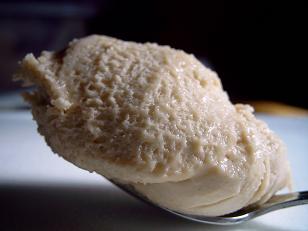
I served it with with reserved caramel sauce.
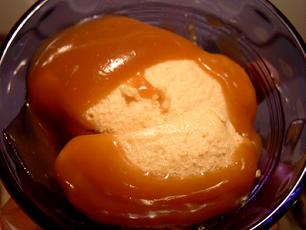
-
Howdy Everyone!
Has anyone else tried making their own chocolate-hazelnut spread? I tried one of the recipes at the link Gifted Gourmet posted. It was very simple, very affordable, and had a taste and texture very similar to the real deal. I think this recipe is more hazelnutty, though, maybe because the hazelnuts are roasted pretty dark.
The recipe I used was:
There is a second recipe at that site I want to try as well, which uses cream as opposed to sweetened condensed milk: Nutella
Anyone know of any other chocolate-hazelnut spread recipes?
To address the original question of the thread -- I like the combination of Nutella and puff pastry: I made some nutella turnovers that were tasty.

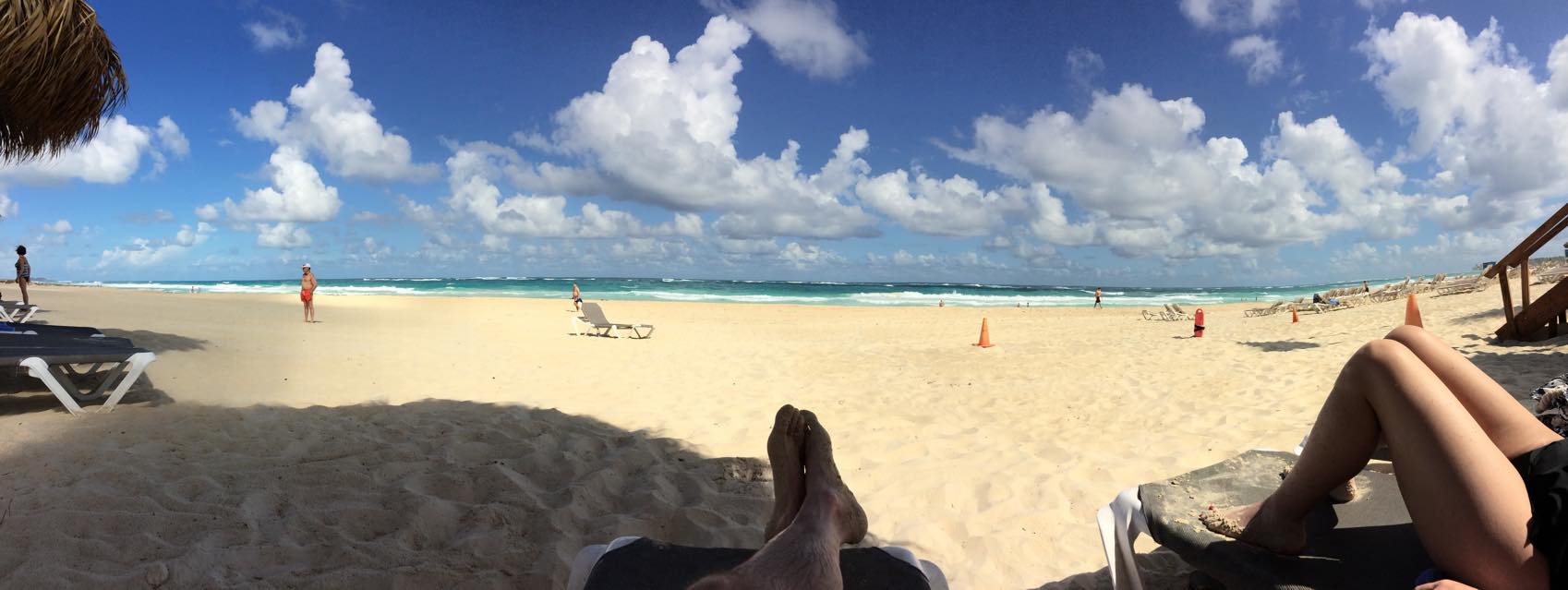

Caramel/Caramelized Sugar [MERGED TOPIC]
in Cooking
Posted · Edited by Patrick S (log)
Sugar burns at 375F. You can get very dark caramel at 335F. I've never cooked sugar to 370, but then, there are lots of things I haven't done.
EDIT TO ADD HANDY LINK: Sugar Stages